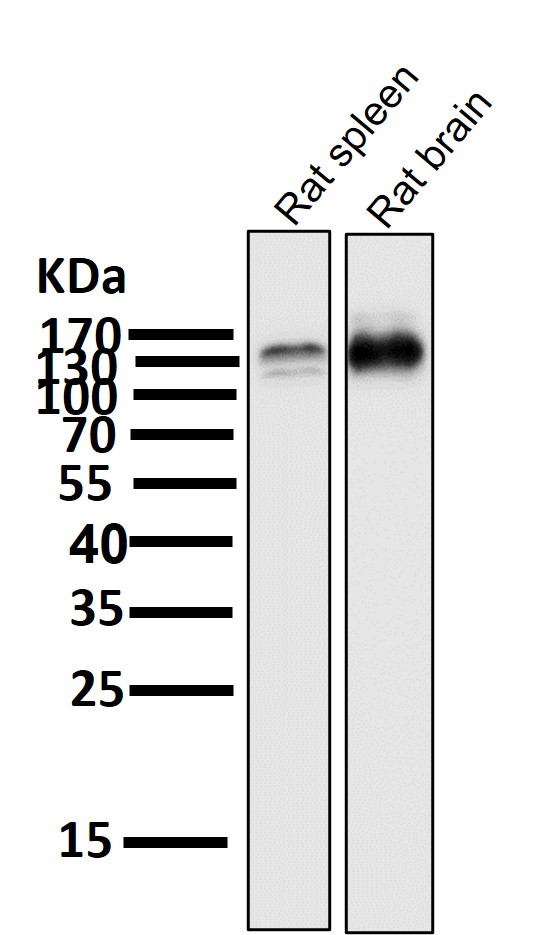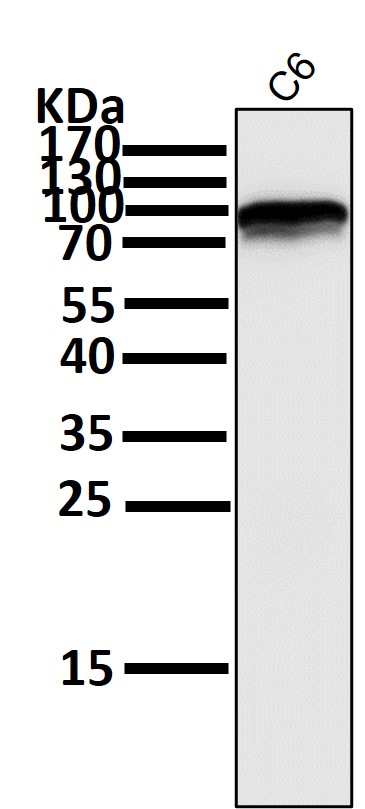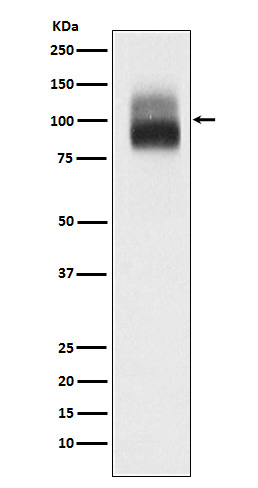


| WB | 咨询技术 | Mouse,Rat |
| IF | 1/20-1/50 | Mouse,Rat |
| IHC | 1/100-1/200 | Mouse,Rat |
| ICC | 技术咨询 | Mouse,Rat |
| FCM | 咨询技术 | Mouse,Rat |
| Elisa | 咨询技术 | Mouse,Rat |
| Aliases | BDNF tropomyosine receptor kinase B; GP145 TrkB; GP145-TrkB/GP95-TrkB; GP95 TrkB; Neurotrophic receptor tyrosine kinase 2; Ntrk2; RATTRKB1; Tkrb; TRKB; TrkB tyrosine kinase; TRKB1; Tropomyosin related kinase B;;Trk B |
| WB Predicted band size | Calculated MW: 92 kDa ; Observed MW: 90,140 kDa |
| Host/Isotype | Rabbit IgG |
| Antibody Type | Primary antibody |
| Storage | Store at 4°C short term. Aliquot and store at -20°C long term. Avoid freeze/thaw cycles. |
| Species Reactivity | Mouse,Rat |
| Immunogen | A synthesized peptide derived from mouse Trk B |
| Formulation | Purified antibody in PBS with 0.05% sodium azide,0.05% BSA and 50% glycerol. |
+ +
以下是3篇与Anti-TrkB抗体相关的文献概览:
1. **"TrkB, a neural receptor protein-tyrosine kinase: evidence for a full-length and two truncated receptors"**
*Klein R. et al. (1991)*
摘要:该研究首次克隆了TrkB受体基因,并描述了其两种截短亚型。通过Anti-TrkB抗体的免疫印迹分析,揭示了TrkB在中枢神经系统中的广泛表达,为后续研究神经营养因子BDNF的信号传导奠定了基础。
2. **"TrkB tyrosine kinase receptor expression in human neuroblastoma enhances cell proliferation and provides prognostic value"**
*Nakagawara A. et al. (1994)*
摘要:利用Anti-TrkB抗体检测神经母细胞瘤组织中TrkB的表达水平,发现高表达TrkB与肿瘤细胞增殖加速及患者不良预后相关,提示TrkB可能成为癌症治疗的潜在靶点。
3. **"Small-molecule TrkB agonist reverses synaptic and cognitive deficits in a mouse model of Alzheimer’s disease"**
*Longo F.M. et al. (2016)*
摘要:研究通过Anti-TrkB抗体检测阿尔茨海默病模型小鼠脑内TrkB表达变化,发现小分子TrkB激动剂可逆转突触功能损伤和认知障碍,为神经退行性疾病治疗提供了新策略。
4. **"Characterization of Anti-TrkB Antibodies for Western Blotting: Implications for BDNF Signaling Studies"**
*Cazorla M. et al. (2020)*
摘要:系统评估了多种商品化Anti-TrkB抗体的特异性及适用性,指出不同抗体对全长型和截短型TrkB的识别差异,为研究者选择合适抗体提供实验依据。
这些文献覆盖了TrkB抗体的基础研究、疾病机制及实验技术优化方向。
Anti-TrkB antibodies are essential tools in neuroscience and biomedical research for studying the tropomyosin receptor kinase B (TrkB), a key receptor tyrosine kinase encoded by the *NTRK2* gene. TrkB binds brain-derived neurotrophic factor (BDNF) and related neurotrophins (NT-4/5), activating downstream signaling pathways (e.g., MAPK, PI3K-Akt, PLCγ) critical for neuronal survival, differentiation, synaptic plasticity, and cognitive functions. Dysregulation of TrkB signaling is implicated in neurodegenerative disorders (Alzheimer’s, Parkinson’s), depression, epilepsy, and cancers (e.g., neuroblastoma, gliomas).
Anti-TrkB antibodies enable detection of TrkB expression, phosphorylation status, and localization via techniques like Western blot, immunohistochemistry, and immunoprecipitation. They are used to explore TrkB’s role in disease mechanisms, therapeutic responses, or neurodevelopmental processes. Some antibodies target extracellular domains to block ligand binding or intracellular regions to inhibit signaling. Additionally, TrkB-targeting therapeutic antibodies and small-molecule inhibitors (e.g., larotrectinib) are under investigation for cancer treatment. Researchers also utilize these antibodies to validate TrkB as a biomarker or assess its expression changes in disease models, aiding drug discovery and mechanistic studies. Their specificity and validation (knockout controls, ligand stimulation) are critical to ensure accurate experimental outcomes.
×